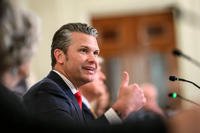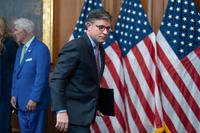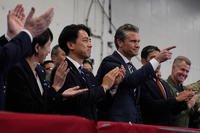The Saudi officer who carried out a terrorist attack on a Florida military base began radicalizing as early as 2015 -- years before arriving in the U.S. to train alongside American troops, the FBI director said on Monday.
Federal law enforcement agents were able to unlock two phones owned by Mohammed Alshamrani six months after he shot and killed three sailors and injured eight others in an attack on Naval Air Station Pensacola. The phones showed Alshamrani began embracing terrorist ideology about two years before he began training on U.S. military bases in 2017.
"This is an important moment in an important case," FBI Director Christopher Wray said on getting access to Alshamrani's phones. "It's important because of what accessing the evidence of this killer's phone allows us to do to protect the American people."
Read More: FBI Finds Link Between NAS Pensacola Gunman, al-Qaida
Alshamrani was sharing plans and tactics with members of the group al-Qaida in the Arabian Peninsula, or AQAP, Wray said, and was coordinating with them and providing them an opportunity to take credit for the attack.
Defense Secretary Mark Esper indicated on Monday that the FBI's continued investigation could lead to new procedures to protect troops working with international service members.
"Based on the FBI findings, and in addition to already executed protective measures, the Department will take further prudent and effective measures to safeguard our people," Esper said in a statement.
The Navy and Marine Corps have barred foreign troops training on U.S. bases from buying or carrying personal weapons. International military students also face new vetting processes and tighter base-access rules. And the Marine Corps now allows off-duty law enforcement personnel to carry concealed weapons on base because of the attack.
Wray and Attorney General William Barr both slammed Apple after the company declined to assist in opening the locked phones that once belonged to Alshamrani. They held information key to the investigation, Wray said, about Alshamrani's contacts and motives.
Since accessing the phones, Barr said the U.S. has since carried out a counterterrorism operation in Yemen that took out an operative from AQAP who was one of Alshamrani's overseas associates. Barr declined to say whether the operation included air strikes and whether the operative was killed in the attack.
"I'm very pleased with the results of the counterterrorism operation and believe it has further degraded the capabilities of al-Qaida on the Arabian Peninsula," he said.
The FBI's investigation into the Pensacola attack remains ongoing, Wray said. The agency hasn't identified any current threats or operatives in the U.S. based on the information gathered from the phones.
Alshamrani killed three sailors in the attack: Ensign Joshua Watson and Naval Aircrewmen (Mechanical) 3rd Class Mohammed Haitham and Cameron S. Walters. Purple Heart medals were approved for those three, along with the eight others injured in the attack.
Several heroism awards were also approved for those who risked their lives during the attack to save others.
-- Gina Harkins can be reached at gina.harkins@military.com. Follow her on Twitter @ginaaharkins.
Read Next: Pensacola Heroes: How 2 Marines and an Injured Sailor Saved Lives During Mass Shooting














